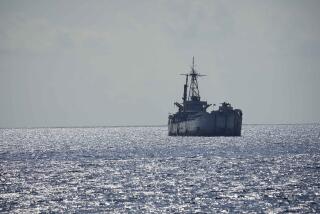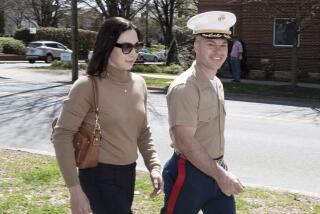Suit Asks Navy to Aid Children Left in Philippines : Courts: The class-action filing charges that the Amerasian youngsters are owed financial help because they are the product of a U.S. policy fostering prostitution.
- Share via
SAN FRANCISCO — An unprecedented lawsuit filed Thursday says the U.S. Navy should pay medical and education expenses for thousands of impoverished Amerasian children fathered and abandoned by U.S. servicemen in the Philippines.
The class-action suit charges that the children are owed the financial support because they are the product of a Navy policy that fostered and encouraged a prostitution industry for sailors stationed or on leave in the island nation.
“Legally, we have a clear obligation to help these children,” said Joseph W. Cotchett, a noted Bay Area attorney who volunteered to prepare the suit after reading about the children’s plight. “But I also believe we have a moral obligation--to acknowledge that they are our responsibility and not just discard them like garbage.”
The lawsuit was filed in the U.S. Court of Claims in Washington on behalf of 8,600 children living in Olongapo City, a former fishing village beside the Subic Bay Naval Station that became a thriving “entertainment” hub for sailors.
When the Navy pulled out of Subic Bay in November after nearly 50 years of operations there, “we agreed to clean up the toxic waste we left behind” but made no provisions for the “throwaway children” fathered by American sailors, Cotchett said.
Although the suit targets only those children in Olongapo City, it could have wide repercussions for another 40,000 Amerasians in the Philippines and for mixed-race children fathered by American servicemen in other countries, Cotchett said.
Lt. Robert Durand, a Navy spokesman in Washington, declined to comment on the litigation, saying to do so would be inappropriate.
Cotchett, a former Army colonel, announced Thursday’s legal action at a news conference. He was accompanied by several Amerasian children and former prostitutes who traveled here from the Philippines to publicize their case.
Alma Bulawan, 31, said she has not seen the American Marine corporal named Ed who fathered her son since she was four months pregnant in 1987. Ed sent letters for a while, Bulawan said, but eventually they stopped.
“I don’t know where he is now,” Bulawan said, pausing to brush away tears as she remembered her years of work as a “hospitality” woman in the bars of Olongapo City. “It is hard to support my son, to pay for food, all the clothing. I came here hoping the government of the United States will (meet its) responsibility and help.”
Another former prostitute, Brenda David, said she fears her 5-year-old son, Tyson, will suffer racial discrimination because his father, a Navy petty officer, is an African-American. Tyson’s father, assigned to the Sperett, knew the child but lost touch after shipping out, she said.
In 1982, Congress gave the children of servicemen in South Korea, Vietnam, Thailand, Laos and Cambodia the right to immigrate to the United States under sponsorship of an American. But children from the Philippines--by far the most numerous such group--have received no such permission.
Cecilia Hofman, who represents a coalition of Filipino women’s groups and traveled to San Francisco with the plaintiffs, said many Amerasian children in the Philippines live “in situations of distress,” often ending up homeless. She called the prostitution industry a “great source of pain in my country, because women were considered sexual commodities, usable and expendable” by the Navy.
Hofman said some of the Amerasian children were born to mothers in their teens who had had no sex education at home or in school. The most common method of birth control was a form of abortion called Hilot massage, in which a woman’s stomach is massaged violently in an effort to dislodge the fetus.
The lawsuit seeks a court order requiring the Navy to provide about $68 million to pay for the health and educational needs of the 8,600 Olongapo City children until they reach age 18. Cotchett’s case essentially rests on a breach-of-contract argument. He contends that the Navy, during its 47-year relationship with Olongapo City, fostered the “rest and recreation” business and provided continual medical treatment and education for the prostitutes.
At one point, the suit says, Olongapo’s nightclub area was within the boundaries of the Subic Bay base. Doctors at a “social hygiene center,” jointly funded by the Navy and the Philippine’s minister of health, examined and treated prostitutes for venereal diseases, and the military issued the women identification cards allowing them to ply their trade.
In 1959, the nightclubs were moved outside the base boundary. But the Navy continued to provide equipment and medicine for the clinic, and in 1986 asked that health screening be expanded to include tests for the human immunodeficiency virus, which causes AIDS, the lawsuit says.
“The women, who had very little to raise their families and children on, relied heavily upon the services provided by the U.S. Navy,” the lawsuit said.
All of this, the suit charges, adds up to an “implied-in-fact contract with these Filipino women to provide medical services and educational benefits to them and to their offspring.”
When they left Subic Bay, Cotchett argued, “the Navy forgot they had a contract . . . and simply left these children outside the base gate, to deal on their own with their plight.”
More to Read
Sign up for Essential California
The most important California stories and recommendations in your inbox every morning.
You may occasionally receive promotional content from the Los Angeles Times.













